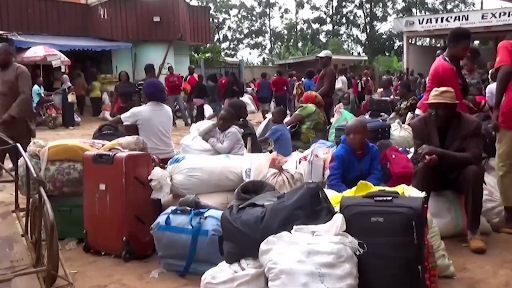Secondary menu
IHRP Working Group: Cameroon Anglophone Crisis Database of Atrocities
By: Julia Cappellacci (3L) and Eric Li (3L)
Credit: Wikimedia Commons
Working Group Leaders: Julia Cappellacci (3L) and Eric Li (3L)
Members: Maria Bon (1L), Rebecca Dragusin (1L), Erfan Ehsan (1L), Qiyang Hong (1L), Parker Hopkins (1L), Yashleen Jhand (2L), Sahara Mehdi (1L), Thomas Mora (1L), Ella Ryu (2L), Allison Zhao (1L), Jerry Zhao (1L)
Background of the Cameroon Anglophone Crisis
Cameroon is an officially bilingual country, with two English-speaking regions and eight French-speaking regions. The Anglophone Crisis is occurring in Cameroon’s English-speaking regions: the South-West Region and the North-West Region.
The Crisis began in October 2016, when Anglophone lawyers and teachers took to the streets to protest the government's placement of French-language judges, teachers, and procedures in the Anglophone regions’ courts and schools. The government met these peaceful protests with force, and in January 2017, jailed the movement's leaders and cut the internet to the Anglophone regions for months. Anglophone activists continued to protest in response, resulting in further escalations. Over time, the situation evolved into a regional armed conflict between various separatist groups and Cameroon’s security forces.
The Crisis has since become a humanitarian disaster, rife with deplorable human rights violations and inhumane violence, perpetrated by both Cameroonian government forces and non-state armed separatist groups. Approximately 6,000 people have been killed, 600,000 have become internally displaced, 80,000 are now refugees in Nigeria, and over 700,000 children are being deprived of school.
Purpose of the Cameroon Anglophone Crisis Database of Atrocities
The Cameroon Anglophone Crisis Database of Atrocities (“Database”) provides an apolitical and non-partisan means for securely storing and verifying digital evidence of war crimes and human rights abuses perpetrated during the ongoing conflict. The curators of the Database hope that this evidence may be used in future legal proceedings that are brought to hold perpetrators accountable following the conclusion of the conflict.
Work Performed by Student Volunteers of the Database
Members of the International Human Rights Program (“IHRP”) student working group contribute to the Database by applying open-source intelligence (“OSINT”) investigative methodologies to verify photographic and video evidence submitted to the Database. These investigations involve using satellite imagery, weather data, solar positional data, social media postings, and other publicly available tools to verify the authenticity of submitted evidence. In conducting these investigations, student researchers focus on the following inquiries:
- Where did the depicted incident occur? (Geolocation)
- When did the incident occur? (Chronolocation)
- Who was responsible for the incident? (Identification of perpetrators)
- What motivated the incident? (Identification of the underlying context behind the incident)
Student volunteers will then verify if the allegations submitted with the evidence are corroborated by the information gathered using OSINT methodologies. In an age of AI-powered deepfake technologies and rampant social media misinformation campaigns, this verification work is crucial for upholding the credibility of the Database and the evidence that it securely stores.
Once the verification analysis has been completed, student volunteers compile their findings in verification reports, which are then published by the Database and may be publicly accessed here.
